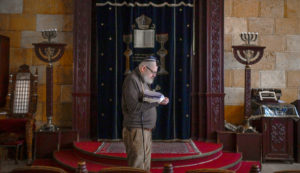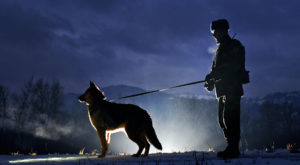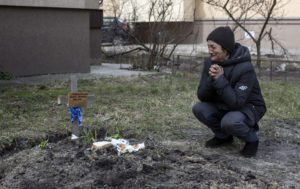Mykolaiv, Ukraine
The lady burrows into the earth. Swathed in blue plastic to protect her against the rain, she pats the soil and digs into it with her hands. She won’t speak to me, but allows me to watch as she tends to her plants and flowers in a patch of soil outside a block of flats in central Mykolaiv.
I count seven plastic water bottles stuck into the ground in a loose circle. Inside each one is a plant that must be protected against the cold and the rain. I crouch down for a closer look. The delicate tangles of green shoots and leaves strain against their clear, blue containers. The only things protecting them from pretty much certain death.
Mykolaiv is on the frontlines of Ukraine’s war in the south. All around us are soldiers and tanks and armour; the only thing that stands between its people and the Russian army. The lady looks at her flowers. “When all this is over,” she says, motioning to the grey skies and falling rain, “they will emerge, and they will bloom.”
***
The road from Odessa to Mykolaiv is littered with checkpoints. Near the village of Svetloe, a familiar ritual begins. We pull up to a melange of concrete slabs and white sandbags from which flies the blue and yellow of the Ukrainian flag. “Britanski zhurnalist,” says Aleksandr, a Ukrainian journalist I am travelling with, to the guard peering through the car window. We hand over our documents. A few, mostly pleasant, words are exchanged and off we go. Once through, we are on the open road.
We are travelling in Aleksandr’s car: a small yellow Volkswagen caddy van with “Press” written on cardboard and attached to the front and side windows. Slipped into the pocket of each front door is a black plate of body armour: “Size: Medium,” it reads. “Man Protection,” Aleksandr says with a grin. “For our balls.”
Aleksandr is familiar with wars. He reported from Syria and covered the war here since its beginning in 2014. In 2015, he was caught in heavy shelling in Luhansk. His hands shake to this day. He is also, according to Nastia, a translator and the third member of our party, a keen metal detectorist.
Rain starts to pour. “The rain in Spain…” Aleksandr says with another smile. He explains to me how war has come to the country. “In this part of the world, corruption is a big problem. That’s why we change presidents so often. That’s the difference between us and the Russians — we change what we don’t like.”
We sluice through the soaking, pockmarked road. “Before the war, there were many here who were pro-Russian; now, after seeing everything they’ve done, they are pro-Ukraine. The Kremlin think we are Russian. We are not. Look, I am ethnically Russian — I speak Russian and will continue to speak it. But I am Ukrainian. To me the situation is like the USA and UK in the 18th century: despite the fact they spoke the same language, they were two countries. Russia thinks we are still its colony, but we are not. We are an independent country.”
After a while, Mykolaiv appears in front of us. More checkpoints. “Don’t film us,” says the soldier. Outside the city, a sign in blue and yellow reads simply: “Mykolaiv is Ukraine.” Inside, it’s clear this is a country at war. There are soldiers everywhere: on the pavement, in shops, milling outside cafes. I see a group optimistically piling into what looks like an old Lada. We stop at a phone shop. A soldier idles by the counter, AK-47 slung across his shoulder.
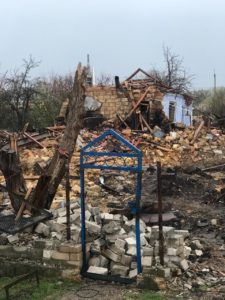
Over the last two days, the city has come under more intense shelling than at any other point during the war. I’ve been repeatedly warned not to come. But Mykolaiv must be seen: it’s the key to the southern front. A ship-building city (the Russian flagship, Moskva, that the Ukrainians recently sank was built here), it is what stands between the Russian army and Odessa. If it falls, Ukraine will lose 85% of its access to the Black Sea, which would cause the country severe economic damage — and now that Mariupol is lost, and Russia has control of the Azov sea, Ukraine would effectively become landlocked.
I want to see the impact of the latest Russian attack and we make our way to Ingulskiy, a residential neighbourhood that has just been shelled. On our way we pass Mykolaiv Zoo, which the Rusians recently shelled — with all the animals still in it. Aleksandr points out that they didn’t target the zoo specifically, but the general area. “Are there any military targets near here?” I ask. “No,” comes the reply.
We pull up at a main road in Ingulskiy. Workmen swarm around a crane that has been erected alongside a row of three-story buildings dappled with blown out windows. In front lies a deep crater where the shell landed. Across the road are houses. “Are there any military targets near here?” I ask. “No,” comes the reply.
Everywhere the story is the same. The Hotel Ingul has a ragged semi-circular hole where much of the roof and upper floors used to be, as if an angry god had bitten a chunk out of it. I visit the Regional Psychiatric Hospital for children with emotional difficulties, which sits alongside a drug rehabilitation centre. Here, the Russians dropped a bomb by parachute. The surrounding buildings have been almost entirely blown out. The bomb crater is about 12-feet wide and several feet deep. I look around. “Are there any…” “No,” Aleksandr replies wearily.
Yet Russia’s shelling has not always been indiscriminate. Early in the war, it targeted the city’s water supply. There has been no running water ever since. Things got tough. The government feared a humanitarian catastrophe, but the roads have been kept open and water is flowing through from Odessa and other cities. At a supermarket car park in the city centre, a truck with a long silver tanker provides water to a line of locals carrying empty plastic bottles. Some have brought trolleys to fill several — they have, they explain, families to provide for. The mood is defiant. “We will be ok,” says Andriy, an entrepreneur. “Things are hard, but we will win.” A dark-haired lady in a maroon t-shirt pulls back her coat to reveal what’s written on it: “We don’t give a fuck about tanks and APCs. We are from Mykolaiv. We are volunteers.”
***
I’m trying to charge my phone in a failing power bank when Oleksandr Syenkevych, the mayor of Mykolaiv, strides into the Daily Sport cafe, takes off his AK-47 along with two clips of ammo and slides into the seat in front of me. Syenkevych has been mayor since 2015. When he arrived, the Pro-Russia Party of Regions was a majority on the city council. He has seen its vote drop steadily ever since.
Syenkevych is keen to assure people that, while the situation is serious, Ukraine remains in control. He tells me that around 40% of the population has left the city. They don’t have accurate figures but calculate this from the amount of garbage collected and water used (before the water supply was bombed, that is).
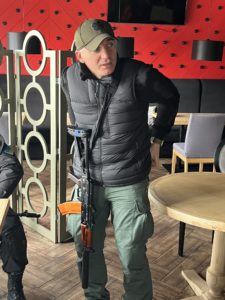
He knows how valuable Mykolaiv is for the Russians: it’s not only the access it offers to the Black Sea — it’s also a centre of Ukrainian agriculture. He knows Moscow will fight hard for it. He also knows he’s now a hunted man. “I move constantly,” he tells me. “I sleep in different places; all I need is my gun and a place to wash.”
“In the beginning I’d get messages from Russians telling me to surrender or face the fate of Mariupol. I told them: either go home and live or come here and die. Welcome to hell, motherfuckers.” He chuckles. “The Russians don’t understand that we live in a democracy. One man can’t decide for everyone. Even if I wanted to surrender, which I would not do. The people would never accept it. They’d shoot me.”
Then he leans across and tells me what Ukrainians, in varying formulations, always do. “Look, we are fighting for our families and our land: we are overmotivated. The Russians are fighting only to die on the orders of Putin. They are undermotivated. What he does is nothing more the genocide. He attacks hospitals, kindergartens, schools; he kills anyone. Everyone who lives in Ukraine has now had a relative who was killed, injured or sent into exile. All this grief he has caused… the people will never forget it.”
***
Roaring down the highway to the villages beyond Mykolaiv where the frontlines are, Aleksandr points to the right: “The Russians are that way,” he says. The ground is gold and the sky is blue: whatever the Russians think, this is true Ukraine. We pass through village after village on our way to Bashtanka, where last month the Russians came and shot the school principal. There was fighting in the street before the Ukrainians eventually pushed them back. “Russians were on the road we are on now,” he says, swerving around a jagged piece of burned metal. We approach the checkpoint guarding Bashtanka; three figures in uniform stand hunched over in the mist.
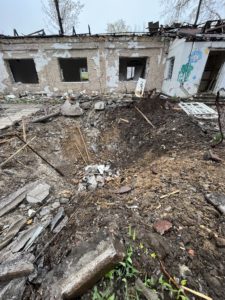
The village is strafed by war. In its centre, a shell has ripped apart the statue of a Soviet cosmonaut. A row of shops has been almost entirely bombed out. But amid blackened concrete and charred wood, a local shop remains defiantly open. Ukraine in miniature. Next door, the building is a shell filled with rubble. There is a sudden movement; an old woman scampers out of a cranny. She seems to have lost her mind. “Everything is CHAOS,” she screams, before crying over her dead husband and breaking into song.
The sound of shelling tumbles through the sky. You cannot escape destruction here. Many of the buildings lucky enough to have escaped direct hits have had their windows blown out. A passing woman tells me that she’s on her way to meet a friend injured in the Russian attacks. She is 77 years old: “I’ve lost my daughter, my husband, my brother. I am no longer scared of anything.”
We drive out of the village. The hail stops. The sun splinters the clouds and bathes our windscreen in light. “Wizard country,” says Aleksandr. “He means magic country,” Nastia says. “I know,” I reply.
Yet none of this can hide what I saw in Mykolaiv and its surrounding villages: the effects of industrial-powered, technologically advanced state violence up close. Still, for all its power and awe and sheer capability, what struck me most is the same absence that I have seen in all conflicts, from the counterinsurgencies of Iraq and Afghanistan to the tribal and sectarian wars of the Congo and Lebanon.
The absence is one of language. All violence is, in the end, a failure of words. Russia has run out of words so it can only attack Ukraine. But it’s worse than that. Those words that it does have — the ones it spouts every day on TV and radio — have become warped and twisted and irretrievably unmoored from reality, and in them is contained the seeds of its own downfall.
Disclaimer
Some of the posts we share are controversial and we do not necessarily agree with them in the whole extend. Sometimes we agree with the content or part of it but we do not agree with the narration or language. Nevertheless we find them somehow interesting, valuable and/or informative or we share them, because we strongly believe in freedom of speech, free press and journalism. We strongly encourage you to have a critical approach to all the content, do your own research and analysis to build your own opinion.
We would be glad to have your feedback.
Source: UnHerd Read the original article here: https://unherd.com

